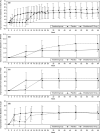Efficacy and safety of brodalumab in the Korean population for the treatment of moderate to severe plaque psoriasis: A randomized, phase III, double-blind, placebo-controlled study
- PMID: 33373480
- PMCID: PMC8246806
- DOI: 10.1111/1346-8138.15733
Efficacy and safety of brodalumab in the Korean population for the treatment of moderate to severe plaque psoriasis: A randomized, phase III, double-blind, placebo-controlled study
Abstract
Psoriasis, a chronic inflammatory skin disease, negatively impacts patients' quality of life (QoL). This randomized, phase III, double-blind, placebo-controlled, multicenter study evaluated the efficacy and safety of brodalumab, a human anti-interleukin-17 receptor A monoclonal antibody, in Korean patients with moderate to severe plaque psoriasis. Coprimary end-points were the percentage of patients with 75% or more improvement in Psoriasis Area and Severity Index (PASI 75) and static Physician's Global Assessment (sPGA) success (score 0/1) at week 12. Secondary end-points included the percentage improvement from baseline in PASI score and proportion of patients with PASI 50/75/90/100 responses. QoL was assessed with the Dermatology Life Quality Index (DLQI). Eligible patients were randomized to receive brodalumab 210 mg (N = 40) or placebo (N = 22) every 2 weeks (Q2W) at a 2:1 ratio for 12 weeks. Subsequently, all patients entered an open-label extension phase and received brodalumab 210 mg Q2W until week 62. At week 12, the proportion of patients who achieved the coprimary end-points, PASI 75 and sPGA success, was significantly higher in the brodalumab 210 mg Q2W group compared with the placebo group (92.5% vs 0%). At week 12, the mean ± SD percentage improvement in the PASI score was 96.87 ± 6.01% in the brodalumab 210 mg Q2W group, which was maintained until study end (week 64). PASI 50/75/90 responses were achieved by 100% of patients receiving brodalumab 210 mg Q2W at weeks 6, 13, and 24, respectively; PASI 100 was achieved by 82.8% of patients at week 64. Brodalumab treatment rapidly improved DLQI scores. The most common treatment-emergent adverse events were nasopharyngitis, upper respiratory tract infections, tinea pedis, and urticaria. Overall, treatment with brodalumab 210 mg Q2W resulted in a rapid and significant clinical benefit and was well tolerated in patients with moderate to severe plaque psoriasis in Korea.
Keywords: Korea; brodalumab; efficacy; psoriasis; safety.
© 2020 The Authors. The Journal of Dermatology published by John Wiley & Sons Australia, Ltd on behalf of Japanese Dermatological Association.
Conflict of interest statement
Haeyoun Jeong is a full‐time employee of Kyowa Kirin Korea Co., Ltd. The other authors have no conflicts of interest to declare.
Figures




References
-
- Greb JE, Goldminz AM, Elder JT, et al. Psoriasis. Nat Rev Dis Primers. 2016;2:16082. - PubMed
-
- World Health Organization . Global report on psoriasis (2016). [Cited 2020 October 8]. Available from https://apps.who.int/iris/handle/10665/204417
Publication types
MeSH terms
Substances
Grants and funding
LinkOut - more resources
Full Text Sources
Medical

